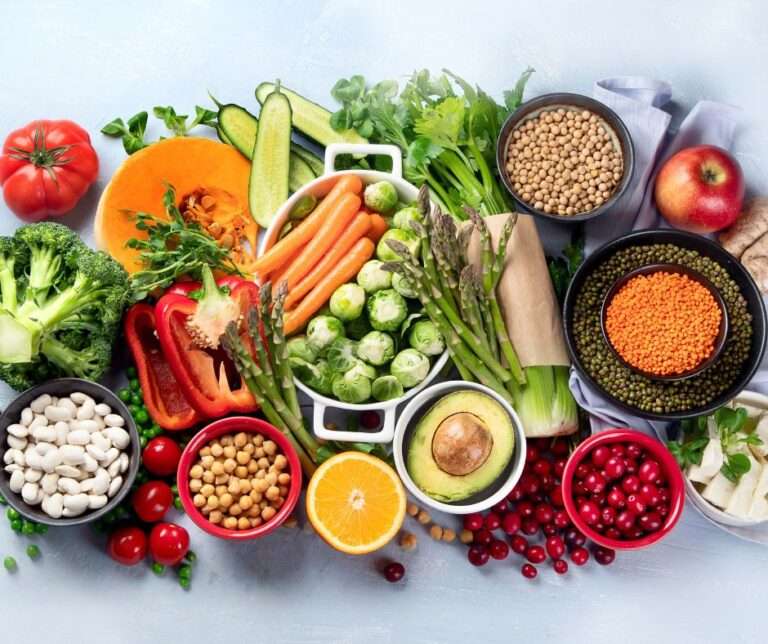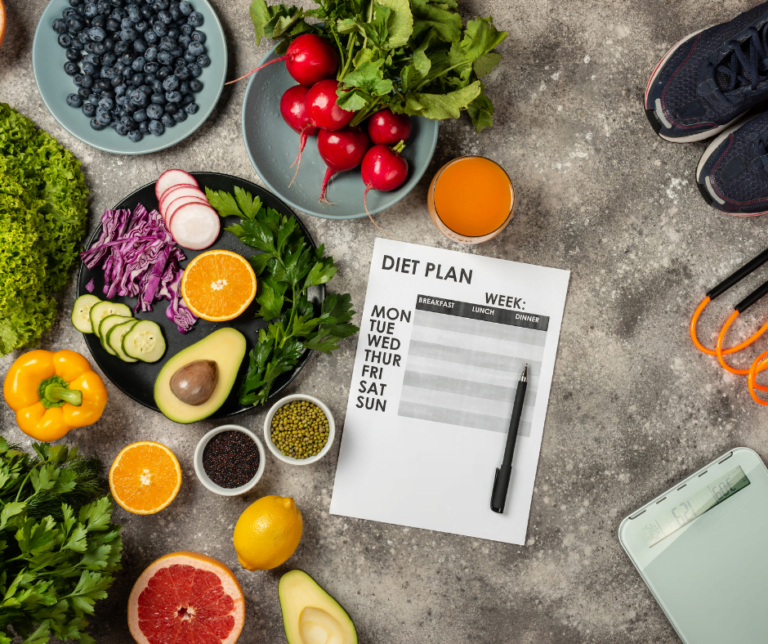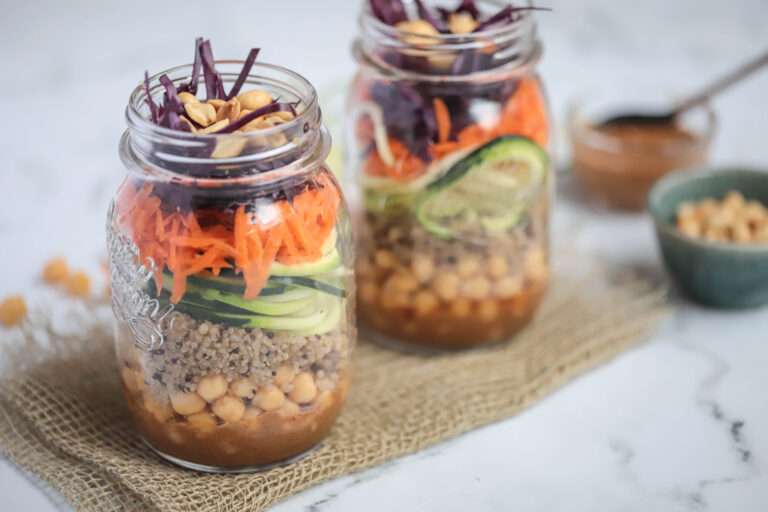Ever wondered how to lose weight sustainably without restrictive diets and starvation? If so, you’re not alone. Countless professional women are in the same boat, striving to regain their health balance while juggling their demanding careers. The solution? Easy plant-based meal planning for weight loss.
At Built By Plants, we believe in the power of a plant-based lifestyle, not just as another diet, but as a way of life. Our approach isn’t about deprivation; it’s about nourishing your body with what it truly needs. This blog post explores the benefits of plant-based meal planning and how a customised meal plan can help you achieve sustainable weight loss.
What’s the Deal with Plant-Based Diets?
First things first, let’s clear the air about what a plant-based diet really means. It’s not just about eating salads all day! A plant-based diet is a colorful mosaic of fruits, veggies, whole grains, nuts, seeds, and legumes. And guess what? It comes in various flavours—vegetarian, vegan, and everything in between.
“But wait,” you might ask, “can I really lose weight on a plant-based diet?” Absolutely! Research has shown that plant-based diets can lead to significant weight loss without the need to count calories. One study published in the Journal of General Internal Medicine found that participants on a plant-based diet shed more pounds than those on other diets. (Read the study here)
The Health Perks of Going Plant-Based
When you swap out animal products for plant-based goodies, you’re not just trimming your waistline—you’re also fortifying your health against some of today’s most common chronic illnesses.

A Heart That Beats Stronger
Did you know that a plant-based diet can be a love letter to your heart? According to a comprehensive study published in the Journal of the American Heart Association, participants who stuck to a plant-based diet had a whopping 16% lower risk of cardiovascular disease and a 32% lower risk of dying from a cardiovascular condition. That’s a big deal for your ticker! Check out the study here.
Keeping Diabetes at Bay
And let’s talk about sugar, not the kind you find in cookies, but the kind that runs through your veins. A plant-based diet can help keep your blood sugar levels in check. A study in the American Journal of Epidemiology found that individuals who followed a plant-based diet had a 34% lower risk of developing type 2 diabetes. That’s a third less worry about one of the most prevalent health issues of our time! Read more about the research.
A Weight Loss Journey That Lasts
Now, let’s circle back to weight loss. It’s not just about looking good—it’s about feeling good and staying healthy for the long run. A plant-based diet is naturally lower in calories and higher in nutrients, which means you can eat more and still lose weight. It’s like having your cake and eating it too, except the cake is made of zucchini, and it’s actually good for you!
Meal Planning: Your Secret Weapon for Weight Loss
Picture this: a world where every meal is a no-brainer because you’ve got a plan. Meal planning is like your culinary compass, guiding you through the maze of nutrition with confidence and ease. It’s the tool that empowers you to sidestep junk food jungles and sail smoothly into the haven of health.
Menu Mapping: Chart Your Course to Balanced Eating
Begin by sketching out a weekly or monthly menu. Think of it as your dietary blueprint, outlining a balanced mix of grains, legumes, fruits, and vegetables. This visual guide ensures you’re not just filling your stomach, but also nourishing your body with a symphony of nutrients.
Scientific evidence backs up the importance of variety in your diet. A study published in the Journal of Nutrition found that a diverse diet can contribute to better health and may even reduce the risk of chronic diseases. That’s why menu mapping is so crucial—it helps you incorporate a wide range of foods, each with its unique set of vitamins and minerals. Explore the study here.
6 FOODS YOU SHOULDN’T CUT OUT IF YOU’RE TRYING TO LOSE WEIGHT

Smart Shopping: Navigate the Grocery Aisles with Precision
With your menu blueprint in hand, draft a shopping list that’s faithful to your plan. This approach is a fortress against the temptation of impulse purchases. A study from the International Journal of Behavioral Nutrition and Physical Activity reveals that individuals who shop with a list tend to have healthier diets and lower body weights. Your list is not just paper; it’s a declaration of your commitment to health. Delve into the research.
Batch Cooking: Your Time-Saving Ally
Embrace the art of batch cooking—your culinary time machine. By dedicating a few hours to prepare large portions of meals, you teleport your future self away from the time-consuming daily grind of cooking. This practice isn’t just about convenience; according to a study in the American Journal of Preventive Medicine, spending more time on home food preparation is linked to a healthier diet and better food choices. So, cook in batches and bask in the glow of ready-to-eat, wholesome meals all week long. Read the full article.
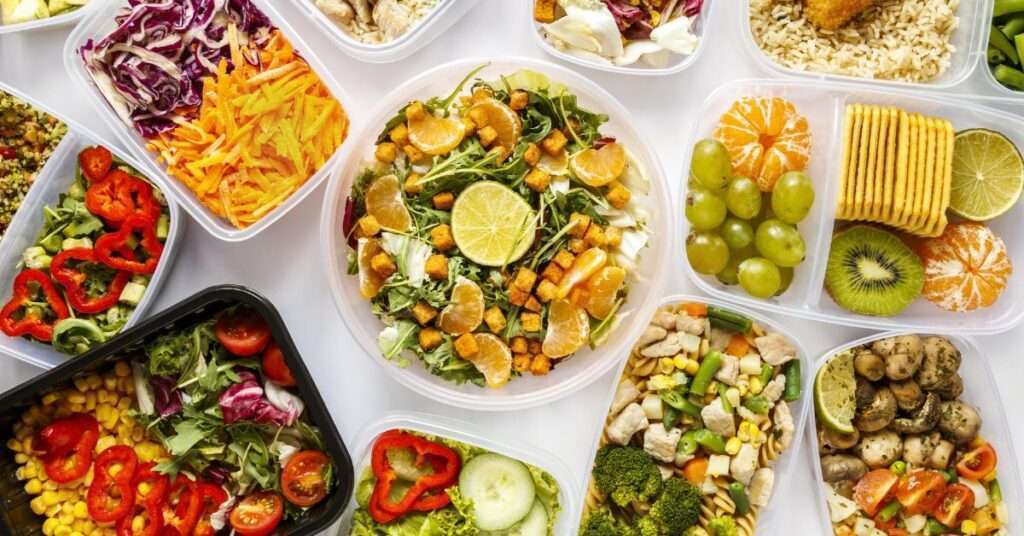
Portion Control: Master the Art of Moderation
Let’s talk about portion control, the unsung hero of weight management. Plant-based or not, the amount you eat matters. A study in the Journal of the Academy of Nutrition and Dietetics highlights that understanding portion sizes can significantly affect weight control. Revel in the abundance of plant-based eating, but remember to honor your body’s satiety signals—savor the flavors, enjoy the textures, and stop when you’re comfortably full. Investigate the findings here.
Easy Steps to Master Plant-Based Meal Planning
One of the most significant hurdles to maintaining a healthy diet is the “what’s for dinner?” conundrum. That’s where meal planning comes to the rescue. Let’s break down the steps to creating an easy, stress-free plant-based meal plan.
Step 1: Assess Your Week
Take a moment to look at your upcoming week. Are there days packed with meetings or after-work activities? Knowing your schedule helps you tailor your meal plan to fit your life. On busier days, you might opt for quick-fix meals, while on more relaxed evenings, you could experiment with new recipes.
Step 2: Choose Your Recipes
Now for the fun part—picking your meals! Start with a few staple meals each week to keep things simple. Maybe it’s stir-fries on Monday, taco night on Tuesday, and a veggie burger on Friday. You can mix up the ingredients to keep it fresh while maintaining a familiar structure. As you get more comfortable, expand your repertoire with new plant-based recipes that excite your taste buds and meet your nutritional needs.
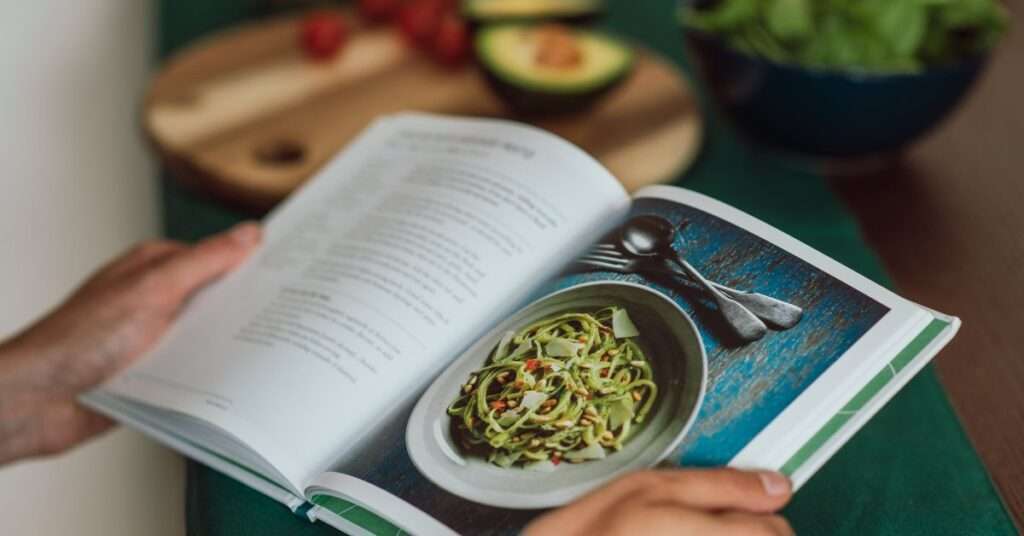
Step 3: Create Your Menu
With your chosen recipes, plot out your weekly menu. Assign each meal to a specific day, keeping in mind the time you’ll have available to cook. Don’t forget to plan for leftovers—they can be a lifesaver for lunches or on days when cooking just isn’t in the cards.
Click here for meal plan sample
Step 4: Make a Shopping List
Your menu in hand, draft a shopping list. Organize it by grocery store sections to make your shopping trip a breeze. Stocking up on pantry and fridge staples ensures you always have the building blocks for healthy meals at home. Think whole grains, canned beans, nuts, seeds, and a rainbow of spices.
Step 5: Meal Prep
Set aside a few hours on a less busy day for batch cooking. This could mean making a big pot of soup, roasting a tray of mixed veggies, or preparing several servings of overnight oats. Having meals ready to go means you’re all set for the week, and it’s a great way to ensure food safety by understanding how long different foods last, whether raw or cooked.

Step 6: Enjoy Stress-Free Meals
With your meals planned and prepped, you can enjoy your week with one less thing to worry about. Embrace the flexibility of your meal plan and don’t stress if things don’t go exactly as planned. Life happens, and your meal plan is there to make things easier, not to add pressure.
Tips for Beginners
- Start Simple: Begin with recipes you’re comfortable with and slowly introduce new ones.
- Pantry Meals: Always have ingredients for a quick pantry meal on hand for those times when plans change unexpectedly.
- Consistency Is Key: Make meal planning a regular part of your routine by setting aside time each week to plan and prep.
- Involve Others: If you’re cooking for family or roommates, get them involved in the planning process. It can make mealtime more enjoyable for everyone.
Strategies for Consistency
- Schedule It: Treat meal planning like an important appointment. Set a reminder to plan, shop, and prep.
- Flexible Containers: Use meal prep containers that allow for mixing and matching. This way, you can assemble meals based on what you’re in the mood for.
- Theme Nights: Taco Tuesdays or Stir-Fry Fridays can add a fun and predictable element to your meal planning.
- Cook in Stages: If batch cooking seems overwhelming, try prepping parts of your meals instead, like chopping veggies or cooking grains.
By incorporating these steps and strategies into your routine, you’ll find that meal planning becomes a natural and enjoyable part of your week. Not only will it support your weight loss goals, but it will also enrich your plant-based lifestyle with delicious, nutritious meals that are ready when you are.
Remember, meal planning is a skill that gets easier with time. So, even if it feels a bit challenging at first, stick with it. Your future self will thank you!
Sample Menus and Recipes: Your Plant-Based Kickstart
Cooking plant-based meals doesn’t have to be complicated. Many recipes are quick and easy to prepare, and they’re packed with flavor and nutrition. From hearty soups to vibrant salads, the plant-based world offers a wealth of options to explore.
To get you started, I’ve put together a downloadable resource with a sample meal plan and 15 beginner-friendly recipes. This guide will provide you with a variety of breakfast, lunch, dinner, and snack ideas to kickstart your plant-based journey.
Download your free meal plan and recipe guide here.
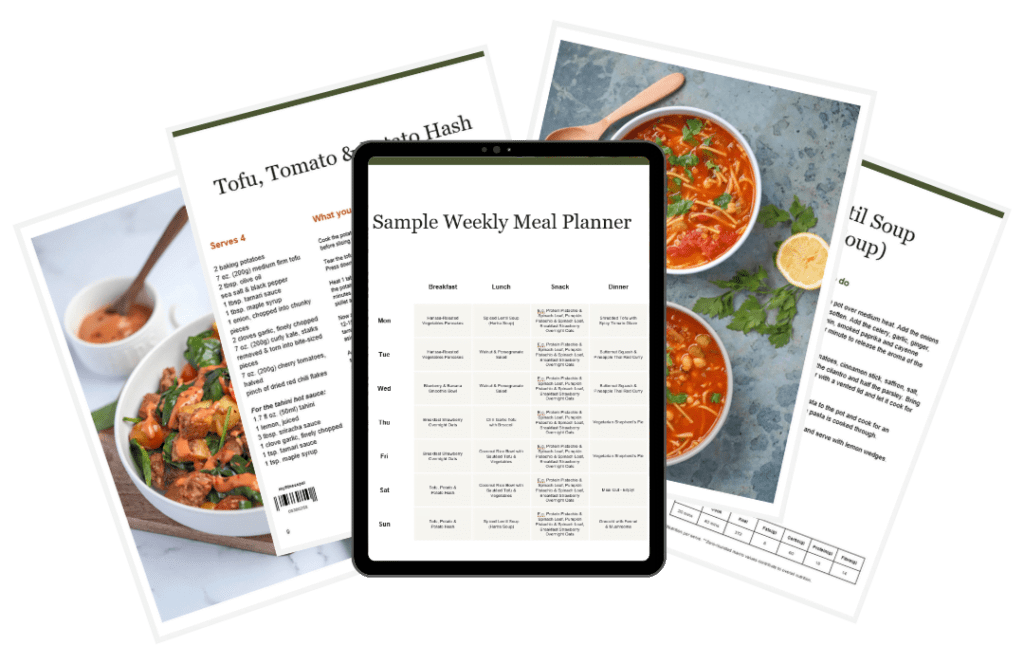
Remember, the goal is not to be perfect but to make small, sustainable changes over time. So, whether you’re going all-in or just dipping your toes into plant-based eating, every step is a step towards better health. Happy cooking!
Nutritional Considerations: The Powerhouse of Plant-Based Eating
As you embark on your plant-based journey, you might have some questions about meeting your nutritional needs. Let’s address some of the common concerns:
Protein in the Plant World
One of the most common queries about plant-based diets is, “Where do you get your protein?” The good news is, plants offer plenty of protein. Foods like lentils, chickpeas, tofu, tempeh, quinoa, and even vegetables like broccoli and spinach, provide ample protein. Additionally, consuming a variety of plant-based foods ensures you’re receiving all the essential amino acids your body needs.
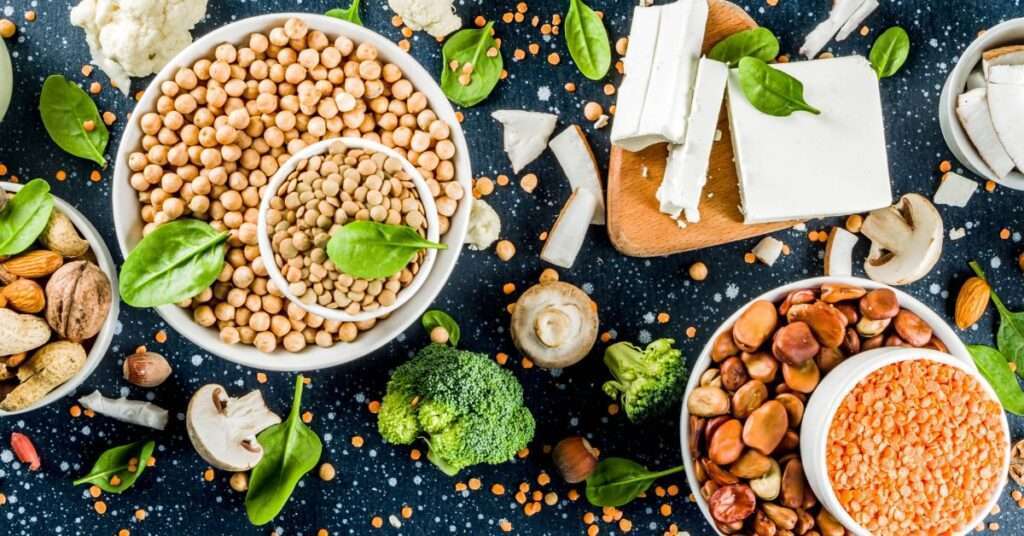
Vitamins and Minerals: Nature’s Multivitamin
When it comes to vitamins and minerals, a well-planned plant-based diet has you covered. Foods like fruits, vegetables, whole grains, and legumes are packed with essential nutrients. However, vitamin B12, which is usually found in animal products, is one nutrient you’ll need to supplement.
Balancing Your Macros and the Magic of Fiber
A balanced plant-based diet provides the right mix of macronutrients—carbohydrates, proteins, and fats. Whole plant foods like fruits, vegetables, whole grains, and legumes are rich in complex carbohydrates and fiber, which provide sustained energy and keep you feeling full.
Plus, fiber plays a pivotal role in maintaining heart health, controlling blood sugar, and supporting a healthy gut. It’s nature’s broom, sweeping through your digestive system to keep things running smoothly.
Customized Meal Plan Subscription: Your Plant-Based Passport to Health
While the journey to a healthier lifestyle is exciting, it can also feel daunting. That’s where our customized meal plan subscription comes in. We take the guesswork out of meal planning by creating a tailored plan based on your unique nutritional needs and weight loss goals.
Our meal plans are crafted by expert nutritionists and packed with delicious, easy-to-prepare recipes. They are designed to ensure you’re meeting your nutritional needs while enjoying a variety of tasty plant-based foods.
With our meal plans, you won’t just be eating—you’ll be nourishing your body and soul, one delicious meal at a time.

Ready to Embrace the Plant-Powered Life?
Our mission is to make your transition to plant-based eating as seamless and enjoyable as possible.
So, are you ready to kickstart your health journey and unlock the power of plants? Subscribe today to our customized meal plan service and take the first step towards a healthier, happier you. Your body—and the planet—will thank you.
Here’s to nourishing your body, feeding your soul, and lighting up your life with the vibrant power of plant-based eating. Bon appétit! 🌱


